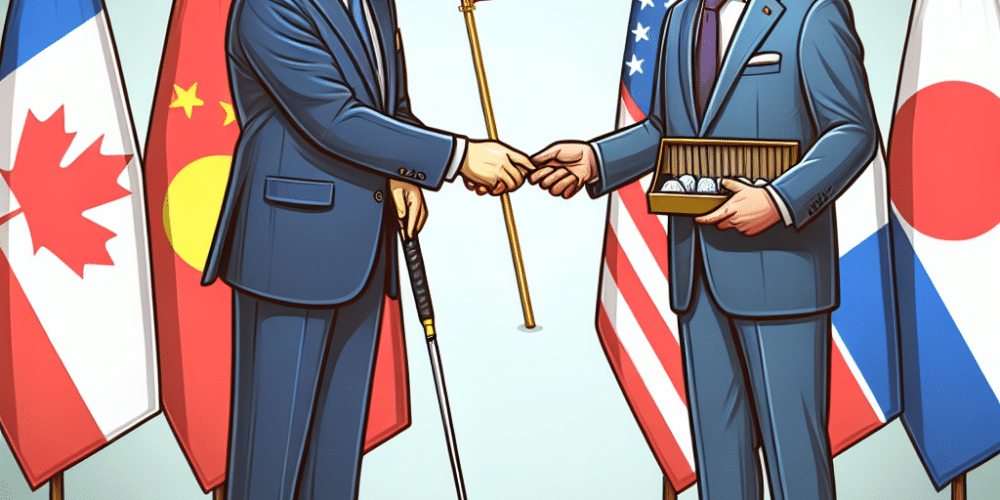In a symbolic gesture during their first meeting, Japanese Prime Minister Sanae Takaichi presented US President Donald Trump with a golf putter that belonged to the late Shinzo Abe. This exchange took place amidst the signing of a crucial agreement between the US and Japan, securing rights to mine and process rare-earth elements and other minerals. This move is seen as part of a broader strategic alignment between the two countries.
Trump and Abe shared a deep friendship and admiration, having bonded over rounds of golf during Trump’s initial presidency. Abe’s tragic assassination in 2022 by a lone gunman shocked the world, and his legacy continues to cast a long shadow in Japanese politics. Trump, recalling their friendship, mentioned how Abe was not just a great friend to him but also a great leader to the Japanese people.
The meeting with Takaichi was also marked by other significant gestures. Trump hosted Akie Abe, the late prime minister’s wife, at his Mar-a-Lago estate shortly after reassuming the presidency, a gesture that Takaichi personally appreciated. Besides the putter, Takaichi also presented Trump with a golf bag signed by 2021 Masters Winner Hideki Matsuyama and a gold-leaf golf ball, acknowledging Trump’s appreciation for the sport.
An additional symbolic act saw Trump and Takaichi signing baseball caps emblazoned with “JAPAN IS BACK,” a slogan popularized by Abe and now embraced by Takaichi. This phrase encapsulates the current Japanese administration’s efforts to assert its presence on the global stage, revitalize the economy, and strengthen international alliances.
Meanwhile, the trial of Abe’s alleged assassin commenced this Tuesday in Nara, drawing significant attention and evoking memories of the late leader’s impact on both domestic and international affairs. The political landscape in Japan remains significantly influenced by Abe’s policies and vision, with Takaichi seen as a steward of his legacy. Analysts suggest that her successful engagement with Trump could bolster her minority government, mitigate challenges arising from Trump’s sometimes unpredictable decisions, and stabilize Japan’s geopolitical standing.
Trump is currently on an extensive Asian tour described by his administration as “historic.” The tour includes stops in Malaysia, Thailand, and Cambodia, where he has engaged with local leaders. The primary focus of these visits has been to broker peace accords, reduce trade barriers, and secure deals critical for mineral resources. Each of these steps is portrayed as integral to enhancing US influence and ensuring economic security through strategic partnerships.
In this context, the gifts from Japan’s Prime Minister are not isolated incidents. International leaders have increasingly resorted to personal gestures to curry favor with Trump. During a visit to Qatar, Trump received a set of golf clubs. Similarly, Ukrainian President Volodymyr Zelensky gifted Trump a golf club that belonged to a wounded Ukrainian soldier, highlighting the symbolic nature of such exchanges.
Some commentators point out that while these gestures may strengthen personal ties, they do not necessarily translate into substantive policy shifts or diplomatic victories. Critics of Trump’s administration argue that such personalized diplomacy might overshadow more critical discussions on trade, security, and economic cooperation. They emphasize that while the optics of personal relationships can be powerful, they must be backed by concrete policy initiatives and mutual commitments to achieve lasting impact.
Nonetheless, Trump’s fondness for golf is well-documented and has become a medium for diplomatic engagement. It is a sport where business and political leaders have historically conducted informal negotiations and built rapport. This tradition continues to shape interactions today, influencing both public perceptions and the intricacies of diplomatic relations.
Reflecting on the broader implications, the Trump-Takaichi meeting and the accompanying gestures underscore the intertwined nature of personal and political relationships in the international arena. As Takaichi forges her path as Japan’s leader, her ability to navigate these complex dynamics will be crucial in maintaining Japan’s influence and fostering a stable and prosperous future.
Such intricacies of international diplomacy reveal a landscape where personal rapport often precedes formal agreements. While some view these exchanges as superficial, others argue they are pivotal in laying the groundwork for more substantial policy developments. As the global community watches these interactions unfold, the balance between symbolic gestures and strategic cooperation remains a focal point in assessing future diplomatic engagements.

David Harrison stands tall in gambling journalism, marrying his firsthand casino experiences with a deep understanding of betting psychology. His articles transform complex gambling jargon into engaging tales of strategy and chance, making the world of betting accessible and enjoyable. David’s knack for narrative extends beyond print, making him a sought-after speaker on gambling trends and future bets. In the realm of gambling, David is both a scholar and a storyteller, captivating readers and listeners alike.
















